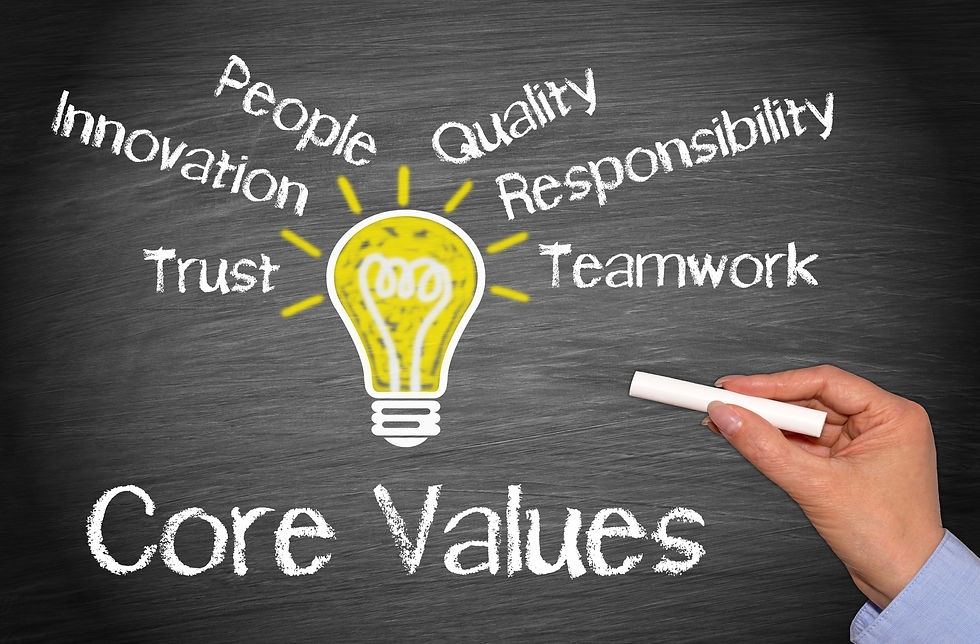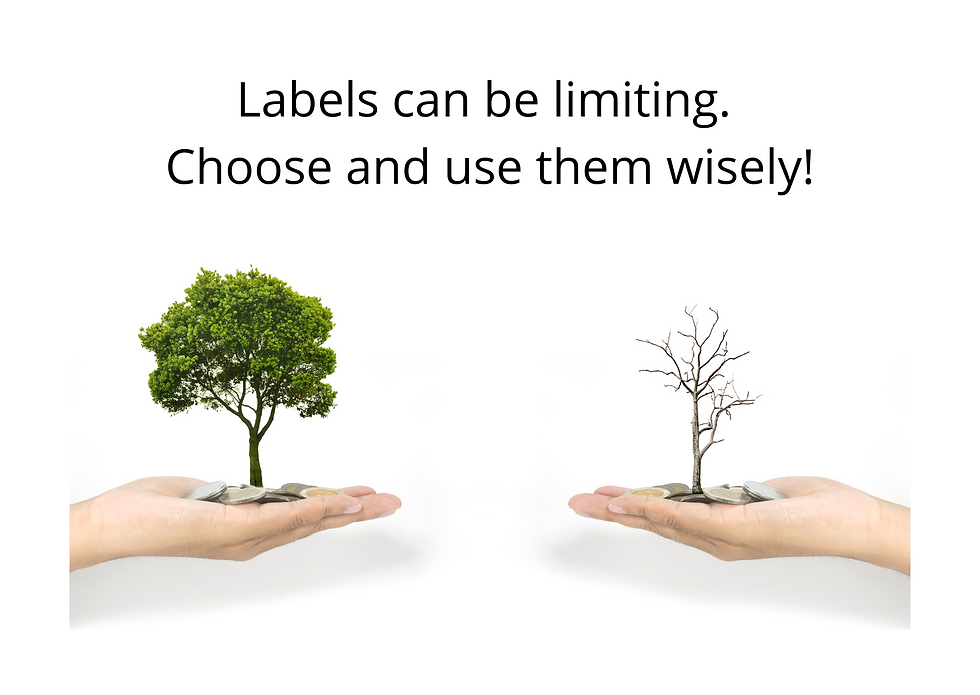The 4 Bs of Career Management – Bring, Be, Buying, Become
- Mary Ely

- Jun 29, 2022
- 6 min read

...or more accurately, the 4Bs of "what I do next with my non-leisure time"...which obviously isn't quite such a catchy name but reflects its wider application in considering things like
what to do in retirement
volunteer roles
self-employment
For simplicity I’ll refer to 'job' and 'career' in this blog.
I was introduced to this framework years ago and I liked it so much, that I use it now to frame the coaching I do.
Why is any sort of planning or management important?
Happiness in any area of your life is generally achieved when
you feel like you’re going in the right direction, doing what feels important to you,
you’re playing to your strengths,
any weaknesses you have aren’t an issue in what you’re doing, and
you’re getting over any obstacles that happen to get in your way.
Applied to your career, this generally means you need to cycle through the following:
Know who you are: your strengths and things you’re not so good at
Know what it is you want
Figure out a plan to get what you want
Execute the plan and get what you want
Enjoy :)
Review
Happy? – continue as you are
Want a change? – repeat the process, updating each step for where you are now.
The process that allows you to do the first four things is the 4 Bs of Career Management: Bring, Be, Buying, Become.
What do you BRING? – what do you have to offer the world?
Where do you want to BE? – what do you want from your non-leisure time?
What are people BUYING? – is there a market for what you bring and what you want to be doing? What are the options and what’s needed for those options?
What do I need to BECOME? – is there some development you need, to be able to do the thing you want, that fits what you bring and what people are buying?
So what's in each?
What do you BRING?
This is all about self-knowledge.
Getting an understanding of all the things that impact what you choose to do and how you do it.
For example, what's important to you about what you do? What are you interested in? What are you good at? What experience do you have?

This part includes
Learning from your history
What can you learn from your career history and how can you use that to make decisions about your future? For example
How long do you normally stay in a role?
Is there a pattern to why you join or leave a job?
What have you enjoyed?
What have been your highlights?
What haven’t you enjoyed?
What do you want to avoid in the future?
What trends do you see and what can you learn that will help you going forward?
What are your values, strengths, capabilities, and behaviours?
These are all linked as explained more in this blog.
And having a good understanding of all of them will help you find a career or job that’s right for you. Here’s why…
Values (what's important to you)

What’s important to you about your career? What motivates you to get out of bed and go to work every day?
Understanding your values is important as
They drive what you focus on, what you’re good at and how you behave.
You’ll generally be happy at work if you’re satisfying your top 3 values.
They often explain why you may be unhappy in your current job. The job, or the way you are doing it, isn’t satisfying something that’s important to you.
…and that last point is key.
Sometimes, we think we need a new job when all we need is to change how we are thinking about our current job or how we approach it, as illustrated in this case study and my client’s quote
“I’m actually still in the same place but much happier. And honestly, the only thing that’s changed is my attitude to it. I did look elsewhere but realised on balance I’m in a good situation that I can make work for me for now.”
How could you change how you think about your job or how you approach it so that your values are satisfied?
Even when you’re determined to get a new job, understanding how you can do this will make the time between now and when you start your new job easier and more enjoyable.
Strengths

Knowing your strengths is really important when it comes to career management.
“What are your strengths and weaknesses?”
…is still a classic interview question so you need to have thought about it.
But lots of people seem to find it really easy to discount what they know or can do, so the answer can be a bit tricky
"I think I’m OK at this, but I’m not an expert, so I can’t say it’s a strength really. Lots of people are better than me."
"That thing I enjoy and find effortless to do? Well, that's just easy. Everyone can do that!"
And even if they don’t discount their strengths, they may find it hard to admit to anyone else that they have them…which makes talking about them convincingly in an interview quite hard!
Career coaching helps you uncover and own your strengths so you can include them in your CV and talk about them authentically in an interview.
And as your ‘weaknesses’ are often overplayed strengths (as explained in this blog), coaching can help you find a way to talk about them too.
Capabilities and behaviour
What are your skills?
What knowledge have you accumulated?
What experience do you have?
What interests you?
…and how many and how much of any of those things
Do you want to use or not in your next job /in your career going forward?
Demonstrate you’re the right person for the job?
Might get in the way of what you want to do next?
…and what might you need to develop?
Something to think about when it comes to the ‘become’ section of this career management framework.
Where do you want to BE?

This section explores these questions
What’s my long-term vision and my intermediate goals?
What do I need from my next job?
...to feel like I’m acting ‘on purpose’? And is that important? (covered in the same blog as values etc that you can find here).
What would good look like?
What are my material needs?
What constraints do I have to work within?
What’s the balance I want to achieve?
What am I looking for next?
What are people BUYING?
What are the opportunities that might fit what you BRING and where you want to BE?
This is about you researching what's out there.
What jobs, volunteer positions or business ideas might be possibilities for you? Who do you know who may be able to help you with advice, ideas or connections?

The first 2 Bs of BRING and BE give you a way of measuring how good a fit the options you find will be for you.
How does my profile compare to the market?
What other opportunities exist that I haven’t already thought of?
How well do the options fit with what I bring and where I want to be?
What do you need to BECOME?
When you consider the output from the first 3 Bs, are there some changes you need to make to become the person that your target audience wants to buy?
For example, do you need to do some personal development, get some specific experience or build your self-confidence for interviews?

Career coaching helps!
Working with a coach through this process makes a big difference, as a coach can help you
Develop your self-knowing by working through each section with you. Encouraging you to challenge your habitual thinking about yourself, others, and the world you want to work in.
Notice things about you and your experience that you may be ignoring or discounting. Things like your strengths and capabilities.
Support you through your thinking as you consider your options, priorities and decisions.
Talk authentically about yourself, what you bring and why you are a good fit for the role you are going for.
Prepare, be yourself and feel confident in interviews.
Feel OK about any jobs you don’t get.
...which makes the whole process of career management and changing jobs simple, manageable, and as enjoyable as possible!
If you’d like to explore career coaching with me, please book a free call and we can have a chat about it.
And if you'd like to try out my monthly emails that provide a roundup of my blogs as well as other insights, you can sign up here.






Comments